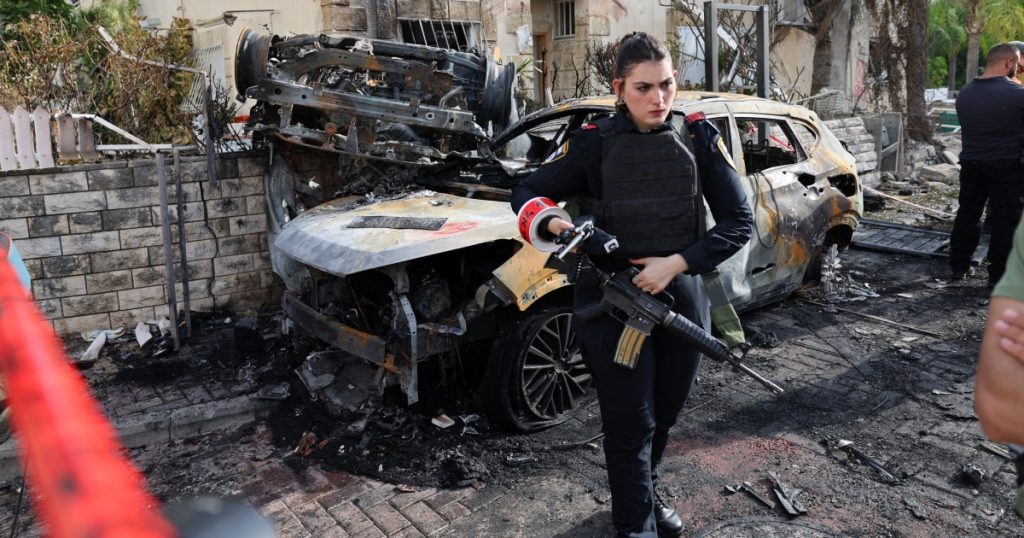Israel and the Hezbollah militant group engaged in a heavy exchange of fire across Lebanon’s border, leading to fears of a wider conflict in the region. The tension escalated as the war in Gaza continued to rage, with dozens of rockets hitting Israel and causing destruction of homes, cars, and communities. Israel Defense Forces reported that three people were wounded by shrapnel in the barrage. In response, IDF fighter jets targeted Hezbollah terror targets, including launchers and military structures in southern Lebanon. Hezbollah retaliated by launching dozens of rockets in response to an Israeli airstrike on a suburb of Beirut that killed senior leaders of the group.
The Islamic Resistance in Iraq, an umbrella group of Iraqi militias backed by Iran, also launched drones at Israel on Sunday amidst the ongoing conflict. Israel and Hezbollah, both labeled as terrorist organizations by the U.S., have been engaged in fire exchanges since the outbreak of the war in Gaza. The conflict in Gaza began with terror attacks by Hamas militants, resulting in the death of around 1,200 people and the hostage-taking of around 250 others, with approximately 100 people still in captivity. Israel’s offensive in Gaza has led to the death of more than 41,000 individuals, as reported by health officials in the region. The attacks have killed dozens in Israel, hundreds in Lebanon, and displaced tens of thousands on both sides of the border.
In a separate incident, Israeli soldiers closed down Al Jazeera’s bureau in Ramallah, in the occupied West Bank, on a Sunday morning. The move has been described as a blatant attack on the channel and its employees, as well as on freedom of speech and the delivery of truth. Al Jazeera had been banned from broadcasting in Israeli territory, but had continued operations in the West Bank and Gaza Strip. The government of Israel recently revoked press credentials for Al Jazeera journalists in the country, following the ban of the channel from operating within Israel four months prior.
The conflict between Israel and Hezbollah, along with other involved groups, poses a significant risk of escalating into a wider regional conflict with potential catastrophic consequences. The exchange of fire and retaliatory attacks have resulted in casualties, destruction of property, and displacement of thousands of individuals on both sides of the border. The conflict is further complicated by the involvement of different factions and regional powers, adding to the complexity and volatility of the situation. Efforts to de-escalate the conflict and find a peaceful resolution are crucial in order to prevent further loss of life and destabilization in the region.
The attacks on Al Jazeera and the censorship of media outlets in the region raise concerns about press freedom and the right to information. The closure of Al Jazeera’s bureau in Ramallah and the revocation of press credentials for its journalists in Israel highlight the challenges faced by journalists in reporting on conflicts and sensitive issues. The restrictions on media freedom can hinder the transparency and accuracy of reporting, limiting public access to information and viewpoints. It is essential to uphold and protect the rights of journalists to operate freely and without censorship, in order to ensure the dissemination of accurate and impartial information to the public.
The international community, including relevant stakeholders and organizations, must play a proactive role in addressing the escalating conflict between Israel, Hezbollah, and other groups in the region. Diplomatic efforts, dialogue, and mediation are essential in order to prevent further violence and find a peaceful resolution to the conflict. De-escalation measures, confidence-building measures, and a commitment to dialogue are crucial steps needed to avoid a wider regional conflict and promote stability and peace in the region. It is imperative for all parties involved to prioritize de-escalation, dialogue, and diplomacy in order to prevent further loss of life and mitigate the devastating impact of the ongoing conflict on the civilian population.


